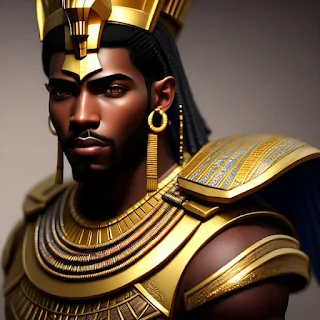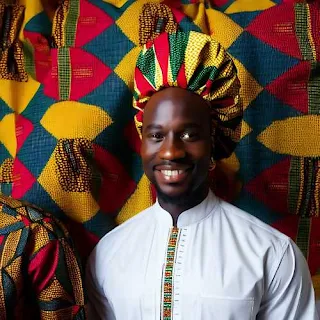Titles of Pharaoh, Emperor, Head of State, King, Queen and Ruler are different types of leaders in ancient to present-day Africa.
For a broader look at masculinity and identity, explore African Men: Identity, History & Culture.
Titles serve an important social and practical functions, helping to establish identity, authority, and respect. Titles indicate key figures in the political systems of many African countries, responsible for leading the government and representing the country at home and abroad.
What is a Pharaoh?
A pharaoh was the title given to the rulers of ancient Egypt. The pharaohs were considered to be both divine and mortal, and were believed to have been appointed by the gods to govern Egypt on their behalf.

|
| A pharaoh was the title given to the rulers of ancient Egypt. |
The pharaohs were absolute monarchs who had supreme authority over all aspects of Egyptian life, including politics, religion, and culture. They were responsible for maintaining order and stability in the kingdom, as well as overseeing important projects such as the construction of temples, pyramids, and other public works.
The role of the pharaoh was closely tied to religion, and the pharaohs were believed to be living gods who had the power to communicate with the gods and goddesses of Egypt. As such, the pharaohs were responsible for overseeing the construction and maintenance of temples, and for ensuring that the gods were properly worshipped and appeased.
The pharaohs were also responsible for the administration of justice, and were the final authority in legal matters. They appointed officials to assist them in governing the kingdom, including priests, scribes, and other administrators.
The pharaohs were among the most powerful rulers in history, and their legacy can be seen in the many monuments and works of art that they left behind, including the great pyramids of Giza, the Sphinx, and numerous other temples, tombs, and sculptures.
There are no longer any Pharaohs in Africa today. The Pharaonic era of ancient Egypt ended more than two thousand years ago with the death of Cleopatra VII in 30 BCE. While the legacy of the Pharaohs can still be seen and celebrated in modern Egypt, the title of Pharaoh no longer holds any political or governing power in the country or in any other part of Africa.
What is a Emperor?
An emperor is a monarch who rules over an empire, which is a large and diverse political unit composed of multiple territories or nations. The term "emperor" is typically used to describe a male ruler, although there have been a few female empresses throughout history.
Emperors often have greater power and authority than kings or other types of monarchs, as their rule extends over a larger and more complex political entity. Emperors may have absolute power over their subjects, or they may have to contend with other centers of power, such as a parliament or council.
The title of emperor has been used by many different cultures throughout history. Some of the most well-known empires include the Roman Empire, the Chinese Empire, the Ottoman Empire, and the Holy Roman Empire. In each of these cases, the emperor played a key role in shaping the culture, politics, and society of the empire.
Emperors have often been associated with ideas of divine or semi-divine power, and in some cases, they have been worshipped as gods or seen as intermediaries between the divine and the mortal realm. The legacy of many famous emperors can still be seen in the art, architecture, and literature of the cultures they ruled over.
What is a Queen?
A queen is a female monarch who typically inherits her position from a previous monarch, usually her father or husband. She is the highest-ranking member of a monarchy and is often regarded as the symbolic head of state.
In many cases, a queen has a ceremonial role and performs duties related to representing her country or people, such as attending state functions, meeting with foreign leaders, and performing other public duties.
In some countries, a queen may have more substantial powers, such as the ability to make appointments, sign legislation, or even rule directly. The title of queen can also be used to refer to the wife of a king or the mother of a reigning monarch.

|
| A queen is a female monarch |
What is a King?
A king is a male ruler of a monarchy or kingdom. Kingship is a form of government in which a single person, typically a male, has supreme authority over a specific territory or people. The title "king" is usually hereditary, meaning that it is passed down from one generation to the next within a royal family.
The role and responsibilities of a king vary depending on the time period and the culture in which he rules. In some societies, the king's power is absolute and he has complete control over all aspects of government and society. In other societies, the king is a figurehead with limited power, and the real power is held by elected officials or other advisors.
In many African societies, the king was considered to be a divine or semi-divine figure with supernatural powers. This belief often gave the king greater legitimacy and authority, and he was viewed as a mediator between the gods and the people.
What is a Head of State?
A head of state is the highest-ranking official in a sovereign state, representing that state and its government. The role of a head of state varies depending on the political system of the country they represent, but generally, they serve as the public face of the state, performing ceremonial duties and embodying the values and traditions of the country.
In many countries, the head of state is separate from the head of government, who holds actual executive power. Examples of heads of state include monarchs, presidents, and governors-general. In some countries, the role of the head of state is largely symbolic, while in others, they may have significant executive powers or act as a mediator between different branches of government.

|
| A head of state is the highest-ranking official in a sovereign state. |
What is a Ruler?
A ruler is a person who has the authority to govern or lead others. The term ruler can refer to a variety of different types of leaders, including kings, queens, presidents, emperors, and other heads of state.
A ruler's role and responsibilities can vary widely depending on the type of government they lead and the society in which they operate. In some cases, rulers have absolute power over their subjects, and their word is law. In other cases, rulers may have more limited powers, with checks and balances on their authority.
Rulers are typically responsible for making decisions about matters such as laws, foreign policy, and the allocation of resources. They may also have important ceremonial duties, such as presiding over public events or representing their country on the world stage.
Did you know?
Leadership styles can vary greatly depending on the situation, goals, and personal traits of the leader. Autocratic leader makes decisions without input from others, such as pharaoh and can be seen as controlling or dictatorial. Charismatic leader has a strong personality and is able to inspire and influence others through their charisma and compelling communication skills such as a King or Queen.
More links to articles you will find thought provoking.
-
That African Fabric You're Wearing Isn’t African

-
About neck elongation rings

-
Lighthouses of Egypt and Morocco

-
Mental Illness in Africa Taboos

-
Kente cloth inspired by a spiders web














